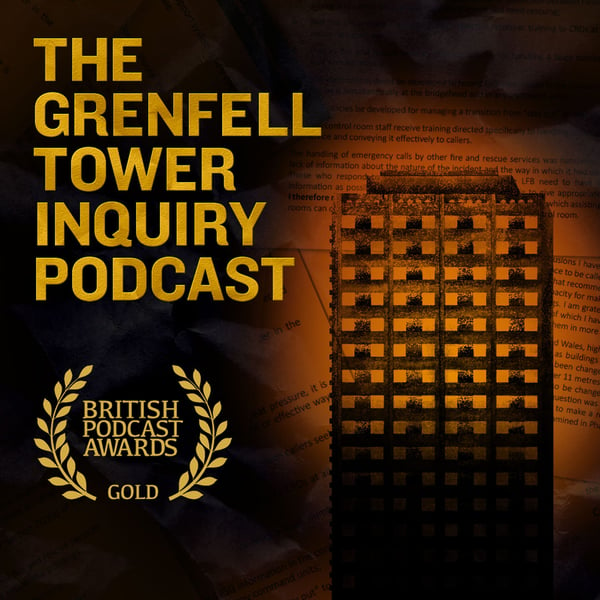139 Kingspan: Week 3
The Grenfell Tower Inquiry Podcast
BBC
4.8 • 627 Ratings
🗓️ 11 December 2020
⏱️ 44 minutes
🧾️ Download transcript
Summary
The inquiry heard how technical staff from the insulation manufacturer Kingspan joked that claims about the fire performance of its insulation product – Kooltherm K15 - were “all lies” and the product should be scrapped.
Kingspan also hired a PR consultancy firm to help it lobby MPs who were deciding the future of building regulations just six weeks after the fire at Grenfell Tower. Emails also showed that to help justify the sale of Kingspan’s combustible insulation on buildings over 18 metres in height, Kingspan carried out a test with a non-combustible insulation deliberately designing it to perform poorly.
Presenter / Producer: Kate Lamble Producer: Sharon Hemans Researcher: May Cameron
Transcript
Click on a timestamp to play from that location
| 0:00.0 | Hello and welcome to the Grenfell Tower Inquiry podcast with me Kate Lamble. |
| 0:10.0 | This week, the inquiry heard the most senior witnesses from Kingspan, |
| 0:13.5 | the company which made some of the insulation installed on the outside of Grenfell Tower. |
| 0:18.5 | And we learned the Kingspan technical team joked about the company's |
| 0:21.9 | K-15 insulation, not achieving the fire classifications it was advertised with. All we do is lie in |
| 0:29.0 | here, one Kingspan employee wrote. Also, just six weeks after the fire, Kingspan hired a PR company |
| 0:36.1 | to help them lobby MPs who are deciding |
| 0:38.8 | future building regulations. Kingspan then designed a test with another company's non-combustible |
| 0:44.9 | insulation, so it would, as they put it, have the best chance of performing poorly. This meant |
| 0:51.2 | they could argue to a parliamentary select committee that non-combustible products could be just as dangerous as their own K-15. |
| 0:59.5 | Now, Kingspan's witnesses have been appearing at the inquiry for the past two weeks, and I don't want to spend too much time going over the same issues. |
| 1:07.9 | So before we start this week's evidence, let's quickly go over what we've already |
| 1:12.2 | learnt. My colleague May Cameron is with me. So quickly, Kingspan made plastic foam insulation, |
| 1:19.3 | which was combustible. It couldn't pass tests to show it was of limited combustibility, |
| 1:24.6 | the standard recommended for high-rise buildings by building regulation |
| 1:28.2 | guidance in England and Wales. So to be used in this situation, Kingspan needed to pass |
| 1:34.2 | a large-scale fire test, setting light a mock-up of an entire cladding system, complete with |
| 1:39.5 | insulation, cladding panels, cavity barriers, and so on. That approved the system as a whole, not individual |
| 1:46.5 | products, for use on high-rise buildings. In 2005, Kingspan passed one of these tests, |
| 1:53.1 | with its insulation, cool-firm K-15, alongside non-combustible cement fibre boards. But a year later, |
| 2:00.4 | it changed the way its material was produced. |
| 2:02.6 | And when Kingspan tested the new version of its product in another large-scale fire test, |
... |
Please login to see the full transcript.
Disclaimer: The podcast and artwork embedded on this page are from BBC, and are the property of its owner and not affiliated with or endorsed by Tapesearch.
Generated transcripts are the property of BBC and are distributed freely under the Fair Use doctrine. Transcripts generated by Tapesearch are not guaranteed to be accurate.
Copyright © Tapesearch 2025.

